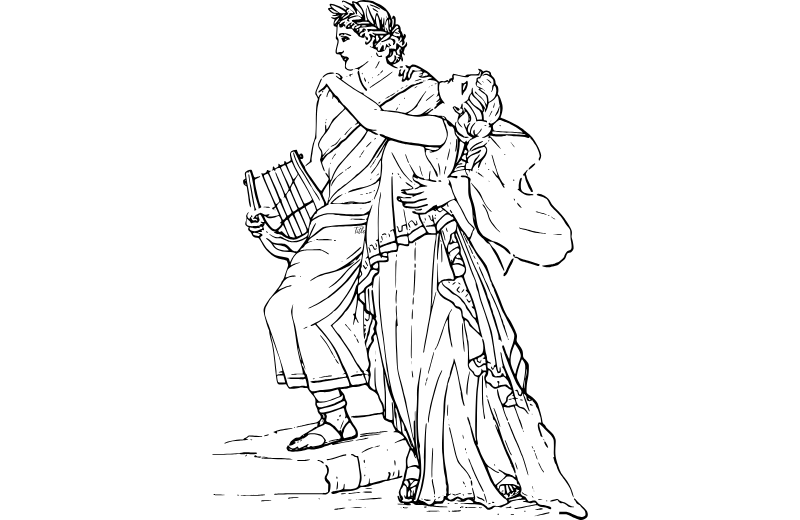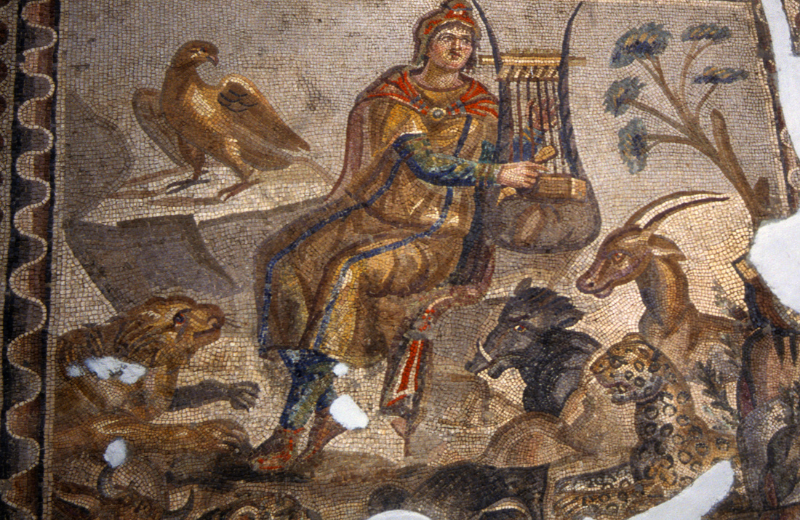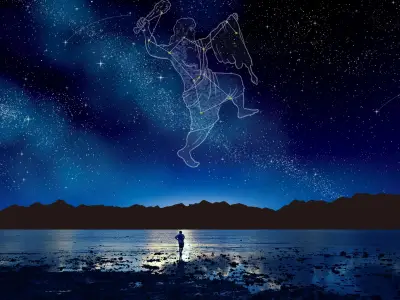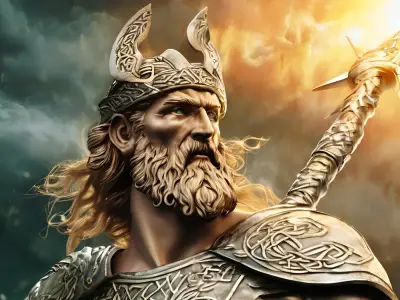If you've ever heard of a musician so talented that even the gods paused to listen, you were probably hearing about Orpheus. In Greek mythology, Orpheus is known as a legendary poet, musician, and prophet.
His story is one of beauty, loss, and the power of art, particularly music, to move even the most unyielding forces—like death itself. Many people discover the myth of Orpheus and Eurydice while exploring ancient stories of love and loss, or through modern adaptations in theatre and film.
This blog post explores who Orpheus was in Greek mythology, the myths that made him famous, his unique powers, symbols associated with him, and why his story has endured for thousands of years.
Jump to:
- Who Was Orpheus in Greek Mythology?
- Orpheus’ Myths
- The Role of Orpheus in Greek Storytelling
- What Powers Did Orpheus Possess?
- Symbols Associated with Orpheus
- Orpheus’ Lineage and Connections
- Why Is Orpheus Special?
- Orpheus in Modern Culture
- Orpheus’ Worship and Legacy
- Frequently Asked Questions About Orpheus
- Study Greek Mythology for £29
Recommended for you!
Best SellersWho was Orpheus in Greek mythology?
Orpheus was a mortal man with extraordinary gifts. He wasn't an Olympian god, but his talents set him apart from others. Known for playing the lyre, a stringed instrument similar to a small harp, Orpheus could charm animals, people, and even stones with his music. His most famous story is a tragic love tale involving his wife, Eurydice.
Orpheus’ Myths

There are three key myths that feature Orpheus: his tragic love story with Eurydice, his role in the voyage of the Argonauts, and his connection to the Orphic Mysteries. Each offers a different glimpse into his character and the lasting impact of his legend.
The story of Orpheus and Eurydice
The most well-known myth involving Orpheus is the story of Orpheus and Eurydice. After falling deeply in love, Orpheus and Eurydice were married. But their happiness was short-lived. Shortly after the wedding, Eurydice was bitten by a snake and died. Heartbroken, Orpheus ventured into the Underworld to bring her back—a place no living person was meant to go.
This myth is one of love, courage, and sorrow. Orpheus used his lyre to soften the hearts of Hades and Persephone, the rulers of the Underworld. So moved were they by his music that they allowed Eurydice to return with him to the land of the living—on one condition: he must not look back at her until they had both reached the surface.
As they ascended, Orpheus walked ahead, filled with doubt. Just before reaching the upper world, he turned to check on her—only for Eurydice to vanish forever. This moment defines the tragedy of the Orpheus and Eurydice myth, a reminder of love’s fragility and the cost of doubt.
Orpheus and the Argonauts
Before his tragic love story unfolded, Orpheus was part of another legendary adventure—he sailed with Jason and the Argonauts in their quest for the Golden Fleece. His role on the ship was as a powerful protector whose music could overcome threats that swords could not.
When the Argonauts encountered the Sirens—creatures whose songs lured sailors to their deaths—Orpheus played his lyre with such intensity and beauty that it drowned out the Sirens’ voices, keeping the crew safe.
Orpheus and the Orphic Mysteries
In some traditions, Orpheus is credited with founding a set of religious teachings known as the Orphic Mysteries. These were spiritual beliefs that focused on the soul, reincarnation, and the afterlife—suggesting that Orpheus wasn’t just a musician, but a prophet and teacher as well.
The Orphic texts, said to have been written by or inspired by Orpheus, offered moral guidance and ideas about purification and the soul’s journey after death. This association connects him with deeper philosophical and religious thought in Greek mythology, showing another side to his mythical persona beyond the lyre and love story.
The Role of Orpheus in Greek Storytelling

Orpheus holds a unique place in Greek mythology. While many heroes are known for physical strength or epic quests, Orpheus is remembered for his emotional depth and artistry. He represents the human desire to reach beyond the limits of life and death and highlights how creativity and expression can influence even the divine.
He was also seen as a bridge between the mortal world and the spiritual realm. His journey through the Underworld, his ability to connect with gods like Hades, and his tragic failure gave him a lasting presence in Greek storytelling and religious thought.
What Powers Did Orpheus Possess?
Orpheus didn’t wield thunderbolts or lead armies—his power came from something far more profound: music and poetry. Here are some of the remarkable abilities and qualities associated with this mythical Greek poet and musician:
- Musical Enchantment: Orpheus played the lyre with such beauty that wild animals, rivers, and even trees would pause to listen. His music could charm all living things and even sway the hearts of gods.
- Voice of Emotion: His singing expressed such deep feeling that it moved both mortals and immortals. Through song, he conveyed love, grief, and longing more powerfully than words ever could.
- Bridge to the Divine: Orpheus used his gift to heal, seek justice, and communicate with the divine. He’s one of the few mortals in mythology who entered the Underworld alive and influenced its rulers through pure artistic talent.
- Power Through Peace: In contrast to the warriors of Greek myth, Orpheus' influence came from his ability to create harmony.
Symbols Associated with Orpheus

Orpheus’ image and legacy are tied to rich and meaningful symbols that reflect his nature and the stories told about him. These are some of the most enduring associations with this mythical Greek poet and musician:
- The Lyre: The most iconic symbol of Orpheus, the lyre represents harmony, creativity, and emotional expression. In ancient art, it’s nearly always shown in his hands, signifying his musical power.
- Animals and Nature: Orpheus is often depicted surrounded by calm animals and elements of nature, such as rivers and trees, which respond to his music. These symbols reinforce his connection to peace, balance, and the natural world.
- Love and Loss: Orpheus also symbolises romantic devotion and the sorrow of separation. The myth of Orpheus and Eurydice has become a lasting metaphor for grief, trust, and the enduring power of love, even in the face of death.
Orpheus’ Lineage and Connections
Orpheus’ mother was Calliope, the Muse of epic poetry, and his father was either the Thracian king Oeagrus or the god Apollo, depending on the version. These divine connections explain his exceptional talent and insight.
Being linked to Apollo, the god of music and prophecy, helped cement Orpheus as a figure of divine inspiration. He was also associated with Dionysus, the god of wine, ritual madness, and ecstasy. In some myths, followers of Dionysus (the Maenads) are said to have caused Orpheus’ death, dismembering him after he rejected all other women and devoted himself to mourning Eurydice.
Why Is Orpheus Special?
Orpheus stands out because he represents the emotional and spiritual side of humanity. He shows us that true power doesn’t always come from force—it can come from feeling, from expression, from love. His ability to touch hearts and minds made him one of the most beloved figures in Greek mythology.
Orpheus in Modern Culture

The influence of Orpheus has spread far beyond ancient texts. You’ll find his story retold in countless books, operas, films, and musicals. One well-known modern adaptation is Hadestown, a musical based on the Orpheus and Eurydice myth, which brings their story into a contemporary, haunting setting.
Another popular example is Moulin Rouge, a film that draws inspiration from Orpheus and Eurydice Greek mythology, blending love, music, and tragedy into a modern tale. His influence even reaches psychology, with the term “Orpheus Syndrome” referring to the struggle to let go of lost love.
Orpheus’ Worship and Legacy
Although Orpheus is not a god, he was honoured in many ancient traditions. Some even founded mystery religions based on his teachings, often called Orphic Mysteries. These spiritual practices focused on the soul’s journey, rebirth, and the afterlife—ideas that appear throughout Orpheus’ myths.
So, while Orpheus wasn’t a god, his legacy is godlike in its reach. He influenced music, philosophy, and religious thought for generations. His name lives on, and his story still stirs the imagination.
Recommended for you!
Best SellersFrequently Asked Questions About Orpheus
What is the meaning of Orpheus?
The word “Orpheus” is thought to mean “darkness of night” or “the one who heals with song.” It reflects both his mysterious nature and his healing, emotional power. His name has become a symbol of artistic inspiration and the soul’s longing for connection.
How did Orpheus die?
In most versions, Orpheus’ death came at the hands of Maenads, who tore him apart after he refused their advances. His head and lyre floated down the river, still singing. Some stories suggest this act was a form of divine punishment for turning away from the gods or rejecting love.
Why did Hades make Orpheus not look back?
It was a test of trust. If Orpheus had believed fully in the gods' promise, Eurydice would have been saved. His doubt, his inability to wait, is what led to her final loss. This condition also reflected the deep symbolic divide between life and death—something that must not be questioned or reversed.
What was Orpheus’ fatal flaw?
His fatal flaw was his inability to trust and his overwhelming grief. He symbolises how love can cloud judgment and how doubt can destroy even the greatest hopes. His tragic end teaches the consequences of impatience and the difficulty of navigating profound loss.
Is Orpheus a hero or a villain?
Orpheus is often considered a tragic hero. He acts out of love and hope, not malice. His story is not one of villainy, but of human vulnerability. His journey to the Underworld is one of the most emotionally driven quests in mythology, rooted in love rather than conquest.
Did Orpheus have male lovers?
Some ancient sources suggest he may have taken male lovers after losing Eurydice, which wasn’t unusual in Greek myth. These relationships were often spiritual or educational in nature, reflecting deep bonds rather than modern categories. His turn away from women after Eurydice’s death highlights his enduring grief and emotional detachment.
What happened to Orpheus after Eurydice died?
After losing Eurydice for the second time, Orpheus became withdrawn and lived in solitude. He avoided all romantic relationships and focused on his music. His later life was marked by mourning and detachment from the world, as he never fully recovered from his loss.
What is the moral of the story of Orpheus and Eurydice?
The story teaches the importance of faith, patience, and the consequences of letting fear overcome trust. It also explores the pain of grief and the limitations of human power in the face of fate. The tale remains one of mythology’s most moving reflections on love, loss, and hope.
Study Greek Mythology for £29
Orpheus’ story is just one of many captivating tales in Greek mythology, full of complex characters and dramatic twists. If you’d like to learn more about these myths and explore the characters, symbols, and stories that have shaped Western culture, consider enrolling in the Greek Mythology Diploma Course with Centre of Excellence. For a limited time, you can access the course at a discounted price of £29!













